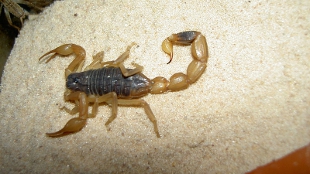
Virologists from China’s Wuhan University may have the next new weapon in the battle against the dreaded methicillin-resistant Staphylococcus aureus (MRSA) bacteria, or any of a number of rising microbes that show resistance to common antibiotics—scorpion venom. Extracting a peptide called BmKn2 from the venom of the scorpion Mesobuthus martensii Karsch, then modifying it into another peptide called Kn2-7, the team was able to boost BmKn2’s natural antibacterial activity while decreasing the unwanted side effect of hemolysis. In vitro, Kn2-7 killed a variety of gram-positive and gram-negative strains of bacteria, including MRSA, a growing cause of hospital infections around the world. The peptide also successfully fought off skin infections in mice.
“They showed it’s possible to take this peptide and turn it into an antimicrobial ...

















